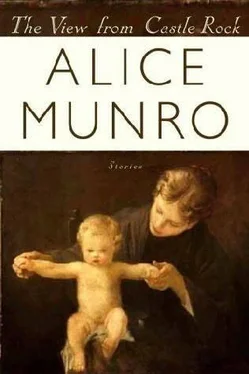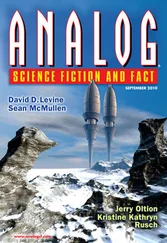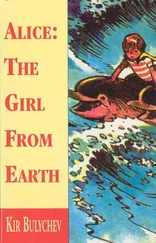If such a man becomes famous, of course, it is another story. Alive he is booted out, dead he is welcomed home. After a generation or two, it is another story.
Hogg escaped, into the uneasy role of the naive comedian, the bumpkin genius, in Edinburgh, and then he escaped, as the author of Confessions of a Justified Sinner, into lasting fame. Laidlaw, lacking his cousin’s gifts, but not apparently his knack for self-dramatization and his need for another stage than Tibbie Shiel’s tavern, made some mark by hauling up the more docile members of his family and carrying them off to America-actually to Canada-when he was old enough, as Hogg points out, to have one foot in the grave.
Self-dramatization got short shrift in our family. Though now that I come to think of it, it wasn’t exactly that word they used. They spoke of calling attention. Calling attention to yourself. The opposite of which was not exactly modesty but a strenuous dignity and control, a sort of refusal. The refusal to feel any need to turn your life into a story, either for other people or for yourself. And when I study the people I know about in the family, it does seem that some of us have that need in large and irresistible measure-enough so as to make the others cringe with embarrassment and apprehension. That’s why the judgment or warning had to be given out so frequently.
By the time his grandsons-James Hogg and James Laidlaw-were young men, the world of Will O’Phaup was almost gone.
There was an historical awareness of that recent past, even a treasuring or exploitation of it, which is only possible when people feel themselves most decidedly removed. James Hogg clearly felt that, though he was so much a man of Ettrick. It is mostly his writings I have to thank for what I know of Will O’Phaup. Hogg was both insider and outsider, industriously and-he hoped-profitably shaping and recording his people’s stories. And he had a fine source in his mother-Will O’Phaup’s eldest daughter, Margaret Laidlaw, who had grown up at Far-Hope. There would be some trimming and embroidering of material on Hogg’s part. Some canny lying of the sort you can depend upon a writer to do.
Walter Scott was an outsider of sorts, an Edinburgh lawyer now appointed to a high post in his family’s traditional territory. But he too understood, as outsiders sometimes do better, the importance of something that was vanishing. When he became the Sherriff of Selkirkshire-that is, the local judge-he began to go around the country collecting the old songs and ballads which had never been written down. He would publish them in The Minstrelsy of the Scottish Border. Margaret Laidlaw Hogg was famous locally for the number of verses she carried in her head. And Hogg-with his eye on posterity as well as present advantage-made sure he took Scott to see his mother.
She recited plenty of verses, including the newfound “Ballad of Johnie Armstrong,” which she said she and her brother had got “from old Andrew Moore who had it from Bebe Mett-lin (Maitland) who was housekeeper to the First Laird of Tushielaw.”
(It happens that this same Andrew Moore had been Boston’s servant and that it was he who had reported Boston as having “laid the ghost” who appears in one of Hogg’s poems. A new light on the minister.)
Margaret Hogg made a great fuss when she saw the book Scott produced in 1802 with her contributions in it.
“They were made for singin and no for prentin,” she is supposed to have said. “And noo they’ll never be sung mair.”
She complained further that they were “neither right settin down nor right spelt,” though this may seem an odd judgment to be made by someone who had been presented-by herself or by Hogg-as a simple old countrywoman with only a minimum of education.
She was probably both simple and sharp. She had known what she was doing but could not help regretting what she had done.
And noo they ’ ll never be sung mair.
She might also have enjoyed showing that it took more than a printed book, it took more than the Shirra of Selkirk, to make a favorable impression on her. Scots are like that, I think. My family was like that.
Fifty years after Will O’Phaup clasped his children and prayed for protection on All Hallows’ Eve, Hogg and a few of his male cousins-he does not give their names-are to meet in that same high house at Phaup. By this time the house is used as a lodging by whatever bachelor shepherd is in charge of the high-feeding sheep, and the others are present that evening not to get drunk and tell stories but to read essays. These essays Hogg describes as flaming and bombastical, and from those words, and from what was said afterwards, it would seem that these young men deep in the Ettrick had heard about the Age of Reason, though they probably didn’t call it that, and about the ideas of Voltaire and Locke and of David Hume, their fellow Scot and Lowlander. Hume had grown up at Ninewells near Chirnside, about fifty miles away, and it was to Ninewells that he retreated when he suffered a breakdown at the age of eighteen-perhaps overcome, temporarily, by the scope of the investigation he saw in front of him. He would still have been alive when these boys were born.
I could be guessing wrong, of course. What Hogg calls essays could have been stories. Tales of the Covenanters being hunted down at their outdoor services by red-coated dragoons, of witches, of the walking dead. These were lads who would try their hand at any composition, at prose or poetry. John Knox’s schools had done their work, and a rash of literature, a fever of poetry, was breaking out in all classes. When Hogg had been at his lowest point, working as a shepherd on the lonely hills of Nithsdale, living in a rough shelter called a bothy, the Cunningham brothers-the stonemason’s apprentice and poet Allan Cunningham, and his brother James-had come trudging over the countryside to meet him and tell him of their admiration. (Hogg was alarmed at first, thinking they came to charge him with some trouble about a woman.) The three of them left the dog Hector to guard the sheep and settled down to talk of poetry all day, then crawled into the bothy to drink whisky and talk of poetry all night.
The shepherds’ meeting at Phaup, which Hogg claims that he himself did not manage to attend, in spite of having such an essay in his pocket, was held in winter. The weather had been strangely warm. That night, however, a storm arose which turned out to be the worst in half a century. Sheep were frozen in their pens and men and horses were trapped and frozen on the roads, while houses were buried in snow up to their roofs. For three or four days the storm continued, roaring and devastating, and when it was over, and the young shepherds came down to the valley alive, their families were relieved but in no way pleased with them.
Hogg’s mother told him plainly that it was a punishment brought on the whole countryside by the Devil’s work being done in whatever reading and conversing was going on at Phaup that night. No doubt many other parents thought the same.
Some years later, Hogg wrote a fine description of this storm, and it was published in Blackwoods Magazine. Black-woods was the favorite reading of the little Brontes, in the rectory at Haworth, and when they each chose a hero to impersonate in their games, Emily chose the Ettrick Shepherd, James Hogg. (Charlotte chose the Duke of Wellington.) Wutbering Heights, Emily’s great novel, begins with a description of a terrible storm. I have often wondered if there is a connection.
I don’t believe that James Laidlaw was one of those present at Phaup that night. His letters don’t show anything like a skeptical, or theorizing, or poetical sort of mind. Of course the letters that I have read were written when he was old. People change.
Читать дальше












